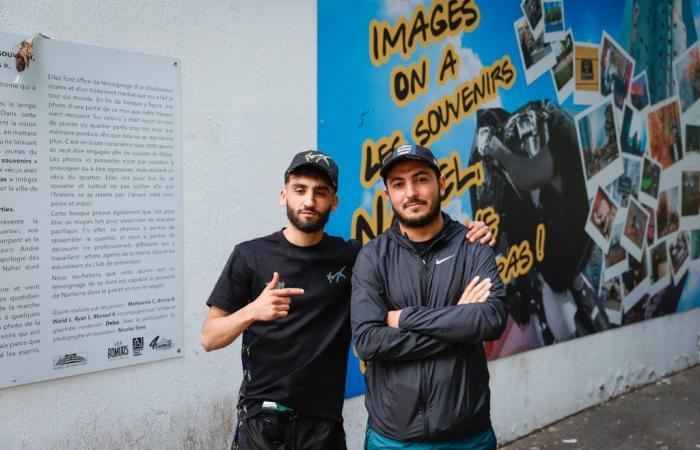Allegory of a neighborhood where life continued, after the murder of this teenager killed by a police officer during a check on June 27, 2023, with the same daily difficulties, deplore residents and associations.
Mohessine Charkaoui, 27, was a “close friend of Nahel”. With four friends, he created this fresco, a reflection of daily life here: the kebab, the café, the motocross bikes, the sunny esplanade at the foot of the famous Nuages towers.
Darker images are superimposed on it: the white march, a burned car, the desperately empty room of the teenager where motorcycle helmets and the PSG flag sit.
“Thanks to the fresco, we showed that we have talents, (…) move a few small bricks, and in the end it makes a wall,” enthuses Mohessine.
He is one of those who was revealed by the tragedy, he who created a sports association and got involved in the already bustling life of his neighborhood after the death of Nahel and the riots that followed.
“All the young people in the neighborhood know him and follow him,” summarizes Loubna Benazzi, interviewed in the premises of Authenti-cité, a stone’s throw from the fresco.
Created in 1993, this association that she has led for six years is working to compensate for the State’s shortcomings, she explains: in particular, it provides educational support for around a hundred young people per year and provides food packages to 250 families.
Since the riots, assures Loubna Benazzi, nothing has changed “and with a budget of 100,000 euros (…), we are fighting: we are lucky that the subsidies do not decrease, but they do not increase either” .
Added to these difficulties are the still visible after-effects of the riots. “The roads are not completely repaired, we have lost the tax center on Avenue Georges-Clémenceau,” which was moved to the prefecture, notes the director.
“Heavy damage to buildings necessarily takes more time, in particular because of the expertise (…) to be carried out”, justifies the town hall, invoking insurance “which does not really play the game”.
Among the municipal buildings, four suffered heavy damage, six others suffered damage, for an estimated cost of 5.2 million euros, details the DVG municipality.
Another subject of concern in this popular town of Hauts-de-Seine: the police presence, whether attributed to the passing of the Olympic flame at the end of July, the “Place Nette” anti-drug operations or the riots.
“Since Nahel, it’s even worse,” laments Khadija Kammour, a volunteer with Authenti-cité.
This visibility on the ground complicates the work of specialized educators, they note.
“I have the impression that young people are less open to exchange and a little more suspicious,” says Damien Henique, former educator and head of department of the Les 4 Chemins association in Nanterre.
There is, however, a “city’s desire” to have “more favorable policies for young people in the neighborhoods”, believes its president Joëlle Vasnier, who recalls that the “Educational City” label brings together the neighborhood’s education stakeholders. benefits from funding of 1.29 million euros over three years.
“But it’s not magic, the issues are so multiple,” she adds. Overall, the mental health of young people, degraded since Covid, has, for example, further deteriorated after Nahel’s death.
“Educators reported seeing very young people sobbing on the evenings of the riots, it was a huge internal upheaval,” she remembers.
– “Transform anger” –
Faced with this dismay, the government’s essentially security response to last summer’s unrest did not convince the neighborhood’s population.
“It’s as if we weren’t part of France,” said Amira Berrah, remembering the accusations against “resigning parents,” during a meeting at the P’Arc en Ciel social center.
This mother regularly meets there with the Women’s Collective of the Parc-Sud district, created by residents after the riots. Together, they drew up a list of 47 proposals to “transform anger into something constructive”, with education as a priority.
This document, now in the hands of elected officials, calls in particular for an end to “discrimination by the network”, which slows down the search for internships for young people in the neighborhood. It also poses the eternal question of their relationship with the police.
“I don’t know how to approach the problem,” breathes Fatiha Abdouni, another member of the collective and former director of the Les Mamans des Pablo association.
Mrs. Berrah gets up to pick up her children from school. She who “never (was) raised to disdain the police”, the subject concerns her: her eldest son is entering adolescence and her concerns are growing.
“It’s not normal that as a French citizen today, we can say to ourselves ‘perhaps my child will be a target’,” she says.
“Even if I give him all the necessary education, even if I don’t have certain difficulties,” she lists, “I know that my son could be a Nahel.”






